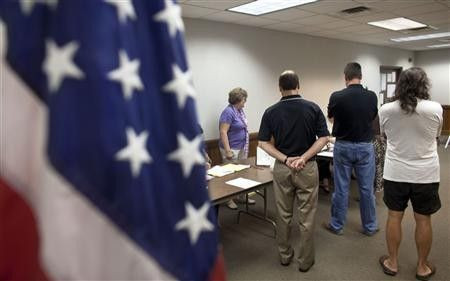Republican senators face recall vote in Wisconsin

Wisconsin voters cast ballots on Tuesday to decide whether to remove six Republican state senators in the nation's largest ever recall election that could signal trends for the 2012 presidential race.
The recall votes resulted from an uproar over Republican efforts to curb the powers of public sector unions and have become a referendum on Republican Governor Scott Walker's conservative policies.
A drive led by Walker earlier this year to limit the power of the unions of public employees prompted massive pro-union protests. Two Senate Democrats also face challengers on August 16 and one retained his seat in a recall vote in July.
Republicans could lose control over the Senate which they just won this year in the traditionally Democratic state that is expected to be a key swing state in the 2012 elections. To retake the Senate, Democrats need to win three of the six races and retain their two seats up for election on August 16.
In the Milwaukee suburbs, where Republican Senator Alberta Darling is trying to hold her seat against Democrat Sandy Pasch, turnout was steady in the first hour after voting opened, a poll worker in Shorewood said.
"I think it's really important for people to show that what is going on in Madison and Governor Walker's leadership are really off the mark," said Nancy Bornstein, a Shorewood resident who voted in the Darling-Pasch election.
Bornstein, a former Shorewood school board member who endorsed Pasch, said the race has galvanized her community.
FOCUS ON RARE VOTES
Recall votes, allowing the replacement of incumbents before their term in office is up, do not exist in many democracies and are rare in the United States.
There have been only 20 state-level recall elections in U.S. history before this year and never six in a single day. All told, there are 10 recall elections planned this year including the nine in Wisconsin and one in Arizona.
Labor unions and their Republican opponents are pouring record amounts of cash into state ballot fights over workers' rights this year that could shape the U.S. political agenda in the 2012 election.
The contests in Wisconsin and Ohio -- another crucial swing state when President Barack Obama runs for re-election next year -- pit newly elected Republican governors and state legislators against traditionally Democratic labor groups.
Both are seen as tests of union strength and Republican staying power after big Republican victories in the 2010 state elections. The tens of millions of dollars being spent -- much of it coming from outside the two states -- are making them among the most expensive state votes ever.
Spending on the nine Wisconsin elections has reached $33 million, most of it from outside special interest groups. Interest group spending has far eclipsed the Wisconsin record of about $20 million set in 2008 elections that covered half the state Senate and all Assembly members.
Wisconsin voters have heard a constant stream of radio and television ads about the race -- and signs for the candidates dot lawns and farmers' fields like late-summer weeds in the contested districts.
The contests have included accusations of dirty tricks -- with Milwaukee prosecutors launching investigations into voter bribery charges in the Pasch and Darling race.
© Copyright Thomson Reuters 2024. All rights reserved.





















